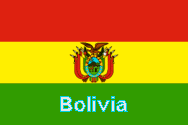Government, opposition hold talks in troubled Bolivia
 La Paz - Bolivia's President Evo Morales and opposition governors from four provinces Thursday launched a round of talks seeking to pacify growing unrest in the troubled eastern crescent of the Andean nation that has centred on income from natural gas and on provincial autonomy.
La Paz - Bolivia's President Evo Morales and opposition governors from four provinces Thursday launched a round of talks seeking to pacify growing unrest in the troubled eastern crescent of the Andean nation that has centred on income from natural gas and on provincial autonomy.
Clashes between government supporters and the opposition claimed an estimated 15 lives in Pando last week as angry opponents of Morales occupied national telephone and tax collection offices and cut off gas line feeds to Brazil.
Five of Bolivia's nine provinces are controlled by the opposition to Morales.
But only four governors were attending the talks at the El Manantial complex near Cochabamba, some 410 kilometres south-west of La Paz - those from Santa Cruz, Beni, Tarija and Chuquisaca.
The fifth opposition governor, Leopoldo Fernandez of Pando, was arrested Tuesday on charges of genocide in connection with the 17 deaths in the village of El Porvenir, in the Amazonian province in northern Bolivia.
Morales has imposed a state of siege, or military occupation, on Pando.
Also at the meeting were Vice President Alvaro Garcia Linera and representatives of the Roman Catholic, Methodist and Evangelical Christian hierarchies in Bolivia as well as international organizations.
"We are all hoping for this national agreement pact. People are awaiting certainty. We came here to secure better days for Bolivians," said Santa Cruz Governor Ruben Costas, a tenacious opponent of Morales.
Costas noted that the opposition will turn over to the authorities Thursday all the public buildings it had occupied.
"That is not a problem," he stressed.
On the agenda for the meeting are three major issues: the royalties on hydrocarbons and the distribution of funds raised through taxes on them; provincial autonomy and the draft for a new constitution; and an institutional deal to make sure that vacant positions in the judiciary and in electoral bodies are suitably filled.
The talks will involve Rural Development Minister Carlos Romero, Finance Minister Luis Arce and Nationalization Minister Hector Arce.
The opposition was represented by governors Savina Cuellar of Chuquisaca, Mario Cossio of Tarija, Ruben Costas of Santa Cruz and Ernesto Suarez of Beni.
The crisis has escalated with the approach of December's referendum on Morales' new constitution, which is the centrepiece of his programme to distribute more of Bolivia's wealth to the impoverished, indigenous majority.
In August, Morales, the Andean nation's first indigenous president, survived a recall referendum with two-thirds of the vote.
Bolivia's population of 10 million has a 60-per-cent poverty rate, affecting mostly indigenous people. (dpa)